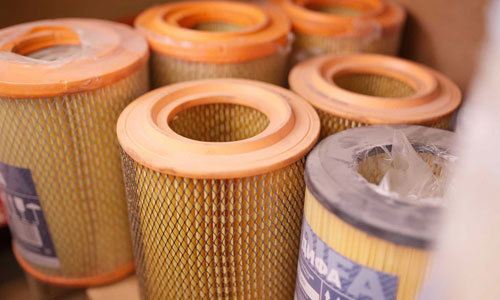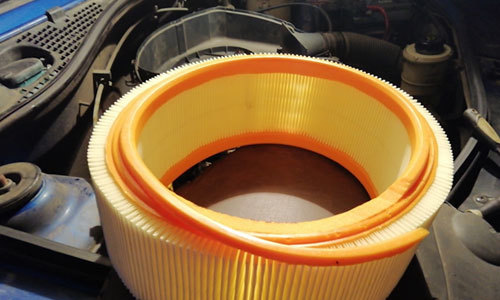Hydraulic Oil Filter: A Key Component in Loader Longevity
2025-07-07
Hydraulic Oil Filter: A Key Component in Loader Longevity
Introduction to Hydraulic Oil Filters
In the world of industrial equipment, **hydraulic oil filters** play a pivotal role in maintaining the efficiency and longevity of loaders. These filters are designed to remove contaminants from hydraulic fluids, ensuring that the hydraulic system operates smoothly. By preventing dirt, debris, and water
Hydraulic Oil Filter: A Key Component in Loader Longevity
Introduction to Hydraulic Oil Filters
In the world of industrial equipment, **hydraulic oil filters** play a pivotal role in maintaining the efficiency and longevity of loaders. These filters are designed to remove contaminants from hydraulic fluids, ensuring that the hydraulic system operates smoothly. By preventing dirt, debris, and water from entering the system, hydraulic oil filters protect critical components such as pumps, valves, and actuators. In this article, we will delve deep into the importance of hydraulic oil filters and their impact on loader performance.
Understanding the Functionality of Hydraulic Oil Filters
What is a Hydraulic Oil Filter?
A hydraulic oil filter is a specialized filtration device that cleans hydraulic fluid before it circulates through the hydraulic system. These filters capture particles that can cause wear and tear, thereby maintaining the cleanliness of the oil. A well-functioning hydraulic oil filter is essential for the optimal performance of loaders.
How Do Hydraulic Oil Filters Work?
Hydraulic oil filters operate on a simple principle: as hydraulic fluid passes through the filter media, contaminants are trapped while clean fluid flows through. The design of the filter media and the filtration process are critical to the performance and lifespan of the filter. Typically, the filters use a combination of physical and chemical processes to capture impurities effectively.
The Importance of Hydraulic Oil Filters in Loaders
Enhancing Efficiency and Performance
A clean hydraulic system is synonymous with improved efficiency. By filtering out unwanted particles, hydraulic oil filters help loaders maintain optimal pressure and flow rates. When the hydraulic fluid is clean, loaders can operate more efficiently, ultimately leading to increased productivity on the job site.
Preventing Equipment Damage
Contaminants in hydraulic fluid can lead to significant damage over time. For example, dirt particles can create abrasive conditions, leading to wear on critical components. A hydraulic oil filter acts as a safeguard, preventing these particles from causing harm and extending the lifespan of the loader.
Types of Hydraulic Oil Filters
Inline Filters
Inline filters are installed directly into the hydraulic system's fluid line. They are designed for easy access and maintenance. These filters are ideal for systems requiring frequent cleaning and replacement.
Spin-on Filters
Spin-on filters are similar to oil filters found in automobiles. They are easy to replace and come as a complete unit, including the filter media and housing. Their design allows for quick changes, making them popular in many loader applications.
Bag Filters
Bag filters utilize a fabric bag to capture contaminants. They are effective for large volumes of hydraulic fluid and are often used in systems where high flow rates are necessary.
How to Choose the Right Hydraulic Oil Filter for Your Loader
Consider the Loader Specifications
When selecting a hydraulic oil filter, it's crucial to consider the specific requirements of your loader. Different loaders operate under varying conditions and may require different filter ratings, sizes, and types.
Check the Filter Ratings
Filter ratings indicate the size of particles that a filter can capture. Understanding these ratings will help you choose a filter that adequately protects your hydraulic system. Look for filters with a high beta ratio for optimal performance.
Evaluate the Operating Conditions
Consider the working environment of your loader. If your loader operates in a particularly dusty or dirty environment, investing in a more robust filtration solution may be necessary.
Maintenance Tips for Hydraulic Oil Filters
Regular Inspection and Replacement
To ensure the longevity of your loader, it is essential to conduct regular inspections of the hydraulic oil filter. Look for signs of wear or clogging and replace the filter as necessary. Generally, it's advisable to replace filters every 200 to 500 operating hours, but always refer to the manufacturer's guidelines.
Clean or Replace the Filters as Needed
Depending on the type of filter, cleaning may be an option. Inline and bag filters can often be cleaned and reused, while spin-on filters should generally be replaced. Regular cleaning and replacement help maintain optimal hydraulic fluid quality.
Keep an Eye on Fluid Levels and Quality
Monitoring hydraulic fluid levels and quality can help identify issues before they become significant problems. Regularly check for discoloration or contamination, as these can indicate a failing filter.
Common Issues Related to Hydraulic Oil Filters
Clogged Filters
Clogging is one of the most common issues faced by hydraulic oil filters. A clogged filter can restrict fluid flow, leading to decreased loader performance. Regular maintenance can help avoid this problem.
Bypass Valve Activation
Many hydraulic oil filters are equipped with bypass valves that activate when a filter becomes clogged. While this feature prevents the system from shutting down, it also means that unfiltered fluid can flow through. Regularly inspect and replace filters to minimize bypass occurrences.
Conclusion
Hydraulic oil filters are a crucial component in ensuring the longevity and performance of loaders. By maintaining clean hydraulic fluid, these filters protect essential components from damage and enhance overall efficiency. By understanding the different types of hydraulic oil filters, selecting the right one for your loader, and following proper maintenance practices, you can significantly extend the life of your equipment. Investing in quality hydraulic oil filters is not just a maintenance task; it’s a commitment to the longevity and reliability of your loader.
FAQs
1. How often should I replace my hydraulic oil filter?
The frequency of replacement can vary, but it is generally recommended to replace hydraulic oil filters every 200 to 500 operating hours. Always refer to the manufacturer's guidelines for specific recommendations.
2. Can I clean and reuse hydraulic oil filters?
Some types of hydraulic oil filters, such as inline and bag filters, can be cleaned and reused. However, spin-on filters should typically be replaced rather than cleaned.
3. What are the signs that my hydraulic oil filter is clogged?
Signs of a clogged filter include reduced fluid flow, increased operating temperatures, and unusual noises from the hydraulic system. Regular inspections can help identify these issues early.
4. How do I choose the right hydraulic oil filter for my loader?
To choose the right filter, consider the loader's specifications, check the filter ratings, and evaluate the operating conditions to ensure optimal performance.
5. What happens if I do not replace my hydraulic oil filter?
Failing to replace a clogged hydraulic oil filter can lead to decreased performance, increased wear on components, and potential system failure due to unfiltered contaminants circulating in the hydraulic fluid. Regular maintenance is essential to avoid these issues.
Key words:
Related News
How often does the air filter change?
The air filter element is mainly used to block impurities such as dust and sand in the air.
2024-05-22
What are the car filters? When do car filters need maintenance?
As an oil filter, it is generally replaced together with the oil during maintenance.
2024-05-22
The choice of filter manufacturers should be considered comprehensively
Before choosing a filter manufacturer, you must understand the relevant background of the manufacturer.
2024-05-22








